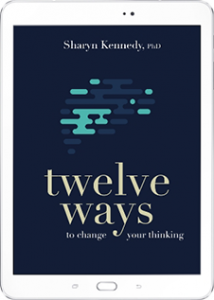This website uses cookies so that we can provide you with the best user experience possible. Cookie information is stored in your browser and performs functions such as recognising you when you return to our website and helping our team to understand which sections of the website you find most interesting and useful.
Why Do I Always Think Terrible Things?

Why Do I Always Think Terrible Things?
Imagine this scenario. You’re walking down the road; the traffic is heavy and loud, but there aren’t very many people on the footpath. You enjoy the feeling of the sun on your face and the freedom of being outside after a hard week at work. You’re on the way to meet one of your closest friends for coffee. You feel good, relaxed and okay with the world. As you’re walking along, you suddenly notice a thud inside of your chest, and you recognize a familiar sinking feeling. Almost immediately, you start to feel anxious, and yet there seems to be no reason. Your brain starts questioning what’s happening as you notice the feeling getting stronger. You look around in vain for something that makes you feel so anxious.
Sound familiar?
What just happened?
You just experienced a Negative Automatic Thought or NAT.
Your brain is constantly interpreting events in your environment with an eye toward protecting your life. When you’re in situations where your life is legitimately in danger, this is very helpful. When you’re in situations where your life isn’t in danger, this can backfire dramatically.
You might have thoughts like these:
- I wonder where they’re going?
- What was Susan talking about this morning?
- I feel awful when she looks at me like that.
- Look at that tree over there.
- Why was that person walking around at work yesterday?
- I have a meeting at 1 pm. I hate sitting around in meetings.
- What if they ask me a difficult question?”
All of these—even the one about the tree—are examples of your brain looking for things that cause feelings of distress or unease because it equates those things with danger.
Brains are particularly interested in two types of information: anything around you that is new to you and anything that gives rise to emotion.
Have you ever noticed how you feel when you exit a scary movie half-way through? It’s likely your brain will spend a lot of time trying to guess what might have happened next and try to make sense of what was happening up until the time you left the movie.
That’s your brain trying to resolve feelings of uncertainty.
Most of the time, we’re not aware of our brain’s constant thinking and rumination, but you’ll probably notice the ideas and attitudes you have towards things. You may feel that specific things or particular people are nice or not nice, good or bad, pleasant or unpleasant.
We all experience and interpret information differently, due to earlier life experiences, childhood upbringing, our culture, and our beliefs and ideas.
It’s not unusual for two people to tell two completely different stories even though they may be talking about the same thing.
Why do brains think negatively?
Our brains are constantly on the lookout for threats, and anything that makes us feel a negative emotion—unease, anxiety, uncertainty, anger, shame—is considered a threat. Our brains are constantly looking for things that make us feel bad.
This isn’t just some brains or just brains of those with anxiety; it’s all of us. It’s a byproduct of our brain’s mechanisms for self-defense. If there’s a detail in our environment that puts our lives in danger, we want our brain to identify it. It’s a tremendous survival trait, but when our lives aren’t in danger, it has some serious drawbacks.
When talking about anxiety, the drawback of this survival trait is that our brains often remind us of things we feel bad about or do poorly, but rarely remind us of things we feel great about or do well.
Our brains tell us what we do wrong much more often than they tell us what we do right.
Why do brains think automatically?
When you have these negative thoughts, you might have noticed that they seem to come out of nowhere. That’s your brain thinking automatically, a process that results from thinking the same thing many times.
Think of something you do often, like your commute to work. When you’re doing it, you don’t have to consciously think about each step the way you would when you’re going somewhere new. That’s your brain automating the thinking process of a common task.
Negative Automatic Thoughts are the same process but applied to a negative feeling.
You might randomly ask yourself what someone was thinking, consider that they might have been thinking about you, assume that they were thinking something bad about you, conclude that they are right to do so, and feel like nobody likes you.
That feels bad when you’re conscious of all the steps, but when you think it often enough that your brain automates the process, the feeling that nobody likes you feels like it comes out of nowhere and is your honest opinion of yourself.
It’s not. It’s the result of a negative spiral that your brain has automated. Others include”
- If you often think “I’m a failure” you may notice that you automatically get a sinking feeling or an anxious feeling when you have that thought
- If you often think “They’re not treating me well” you may notice that you automatically get a jumpy feeling or an angry feeling when you have that thought
- If you often think “It’s all just pointless” you may notice that you automatically get a heavy feeling or a hopeless feeling when you have that thought
Automatic thoughts in your head may be triggered by whatever is in the environment or thoughts, feelings, or memories that you already have.
We often think thoughts that are triggered by what’s in the environment:
- People’s actions
- Events happening
- Phones, weather, traffic etc.
We also think thoughts that are triggered by what’s inside us:
- Our memories
- Things our brain has registered unconsciously
- Worries that bother us
What exactly are these thoughts?
Remember, your NATS are the way your brain thinks and the way your brain processes information.
They are specific to you (only you think this way).
Negative Automatic Thoughts can be:
- A thought, an image, or even an intuition
- Believable. We tend to buy into our thoughts without thinking how realistic they are
- Repetitive and persistent. They become ingrained into your thinking, making ever-deepening grooves in your head so that some of them become very sticky.
- Loud, really demanding, or negative when you’re under stress or upset.
The way to combat these Negative Automatic Thoughts is to do less automatic thinking—to consciously interrupt those thought processes at the start. It’s a lot easier to say that than do it, so I’ve put together a free e-book of techniques you can use to get started today. Get it by clicking the image below.
Categorised in: Thinking.





